5 Character Names That Give Away Movie Plots
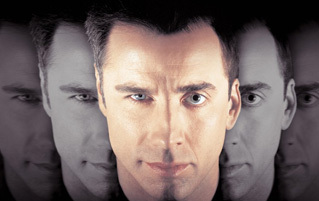
Names can influence our lives in profound and amazing ways. They can determine how much money we make or how attractive we appear to other people, while the more unpronounceable ones can even pose a serious choking hazard to children under 3 and the elderly. (Hope you feel better soon, Grandpa.)
But when it comes to fictional names, their main power is being able to spoil your favorite films harder and faster than "Rosebud McItwashissled." That's because screenwriters absolutely love putting tiny clues into the names of movie characters that flat out tell you what's going to happen with the plot, like how ...
The Name of Nicolas Cage's Character in Face/Off Revealed How He Was Going to Die

In the 1997 installment of John Woo's dove fetish infinite-logy, commonly known as Face/Off, Nicolas Cage plays insane terrorist Castor Troy, who plants a bomb somewhere in Los Angeles. Then, to make sure no one can get any information about it from him, he strategically almost dies and falls into a coma. This leaves FBI Special Agent Sean Archer (John Travolta) with no choice but to have Troy's face transplanted onto him so he can trick Castor's brother, Pollux, into unwittingly giving up the device's location.
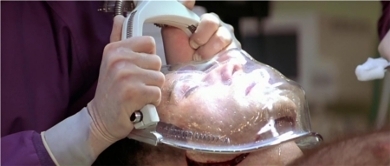
What follows is a typical action movie roller coaster: Things go awry when Troy wakes up, staples Archer's face to himself, and convinces everyone that he's the real thing, then the fairly awry things go even more awry when the original Archer finds and murders his evil doppelganger with a spear gun.
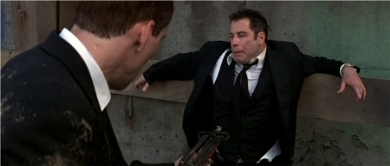
Why We Should Have Seen It Coming:
Wait, "Pollux"? That can't be a real name. That sounds more like a rejected bee-themed supervillain from Captain Planet. In reality, the Troys' monikers are a reference to Castor and Pollux, two brothers from Greek mythology who make up the Gemini constellation, which is Latin for "twins." In the movie, Troy and Archer sort of become each other's twin, and suddenly, BAM, you're in John Woo's symbolism land!
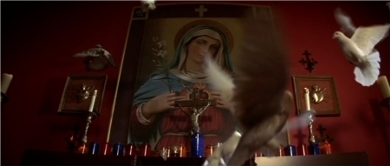
Castor and Pollux were also brothers of Helen of Troy and the protectors of sailors, which featured prominently in the movie finale when Archer chased Troy in a speedboat.

More importantly, though, according to the ancient Greeks, Castor met his end after the Gemini bros got into a feud with their cousins, Lynceus and Idas, which ultimately led to Idas killing Castor ... by impaling him with a spear. Then, a few centuries later, John Woo took that idea, added "gun" to the end of it, and had his ending to Face/Off, which the more observant audience members could've guessed the second the name "Castor Troy" was first mentioned in the film.
Does this ruin Face/Off? No, mainly because it's scientifically impossible to ruin anything that crazy and awesome. There is reality and there is Face/Off, and never the two shall meet.
The Surname "Hayes" Lets You Know How American Beauty Will End

If you're still able to sit through a Kevin Spacey film without retching into a garbage can, 1999's American Beauty was ultimately about the culmination of Spacey's character Lester Burnham's midlife crisis, his obsession with a Angela Hayes, a sexualized child and his death. But it wasn't really a spoiler when he told us at the beginning that he was going to die, because while that does happen, it doesn't really capture all the nuances of the movie's complex, real ending.
Why We Should Have Seen It Coming:
You know what did capture those nuances, though? Angela Hayes' surname, because "Hayes" sounds just like "Haze," as in "Dolores Haze," the titular character of Vladimir Nabokov's Lolita, which immediately draws plenty of weird parallels between the novel and the movie.
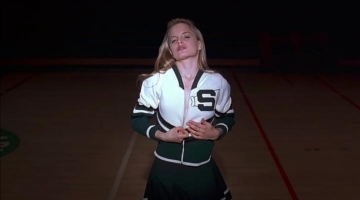

Lolita tells the story of Humbert Humbert, a literary scholar with two failed marriages under his belt and very cruel parents, who kidnap-adopts (kidnopts) a sexualized child because she reminds him of his first love. Similarly, Lester Burnham is a magazine executive in a failing marriage who turns a sexualized child into a symbol of the life he thinks could finally make him happy. Unlike Humbert, Lester eventually sees Angela for the kid that she is, but his obsession still leads to someone getting shot to death. In the movie, that someone is Lester, who gets killed by his neighbor Colonel Frank Fitts for not returning the secretly gay Fitts' advances.
This bears some resemblance to a scene in Lolita where Humbert shoots a man named Clare Quilty for kidnapping Dolores and doing weird things to her. (So ... he pretty much shoots him for plagiarism.)


Both endings deal with the same bizarrely specific formula where a sad middle-aged man lets his sexual frustrations escalate until he pumps lead into a guy whom he believes took advantage of him. Also, there's an underage nymphet involved in it somehow, which you can apparently spoil with a simple spelling variation of "Haze," just like the movie did.
In Inception, Ariadne Had to Be the One Who Ends Up Saving the Day

Christopher Nolan's dream-heist movie Inception has a rather complicated story, to say the least, and to say the most: When I watched it on Japanese TV, there was a small text in the corner letting the viewers know which level of the dream world the action was taking place in.

To me it just proves that the only true international language is "not getting the entire plot of Inception on the first viewing," which also made it impossible to guess what was going to happen next in it ... unless of course you guessed that Ellen Page's Ariadne would be the one who guides Leonardo DiCaprio's Dom Cobb to limbo and helps complete the titular inception on Cillian Murphy. Then you were right on the money, together with anyone else who figured that out thanks to their knowledge of Greek myths.
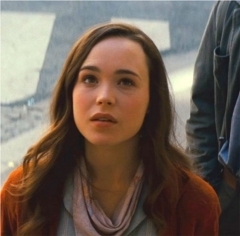
Why We Should Have Seen It Coming:
In Greek mythology, Ariadne was the daughter of King Minos, fell in love with a warrior named Theseus, and helped him defeat the half-man, half-bull Minotaur. She did it by giving Theseus some thread so he could navigate the Labyrinth and kill the beast without getting lost in it, which is subtly referenced in the movie when Cobb first meets Ariadne and outright asks her to draw him a maze.

Consequently, when Cillian Murphy's Robert Fischer gets shot in the dream world and falls into limbo, an infinite area of his subconscious mind, it is Ariadne who convinces Cobb to go down there and look for him. Once they reach limbo, it's once again up to Ariadne to rescue Fischer and bring him back to a higher dream level so the rest of the team can implant the idea in his head that he should dissolve his company and then go put on a rubber bat costume.
But in order to save Fischer, Page's character first had to save Cobb by shooting his imaginary dream wife, Mal (Marion Cotillard), which is just another way of saying that Inception's Ariadne ended up protecting a guy lost in a maze from being killed by a fantastical creature whose name starts with an "M." Man, no wonder John Woo only gave the movie 6 out of 10 doves. He must have seen that ending coming a mile away.
The Secretly Dead Villain of
It's the year 1939 in an alternate universe, and already most of you can guess how the rest of that summary of Sky Captain and the World of Tomorrow probably goes: A bad stand-in for Indiana Jones must fight a retro-futuristic Nazi and his army of diesel punk robots. Also, there are Hindenburg blimps in there somewhere, because alternate history stories about the 20th century without blimps are like Sky Captain without the overused CGI: nonexistent.



In the movie, the bad Indy stand-in is named Joe Sullivan, aka Sky Captain (Jude Law), an ace fighter pilot trying to stop the evil Dr. Totenkopf from launching a rocket that will incinerate the whole planet. By the end, it turns out that the mad scientist has actually been dead the entire time, and that his plans were being carried out by his army of lifeless automatons.
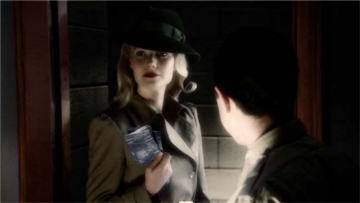
Why We Should Have Seen It Coming:
"Totenkopf" is the German word for "skull," but it was also the name of the insignia worn by the SS, which kind of makes it sound like the name "Totenkopf" was chosen because "Dr. Nazi" performed poorly with test audiences. However, when you break the word down to "toten" and "kopf," it literally means " death's head," which, granted, is a pretty great word for a skull, alongside "calcium brain helmet" and "zombie fiesta bowl." But in the context of the movie, it starts to sound a bit spoilerish when you consider that the dead Totenkopf first appears on screen as a giant floating head:


Admittedly, Dr. "Death's Head" was "portrayed" by old recordings of Laurence Olivier, who himself had been dead for more than a decade when the movie premiered, but it didn't necessarily mean that his character would be dead as well. (Hey, if Jude Law can play an action hero, then Olivier's corpse can totally pull off a non-dead guy.) Maybe the creators of Sky Captain thought that their movie would be such a giant success that they didn't need to make it marketable to German-speaking countries.
Unfortunately, for all the work put into it, Sky Captain was a commercial and critical flop, because even if there had been a demand back then for a bad movie clumsily based on old film serials, most people were apparently willing to wait a couple of years and just go see Kingdom of the Crystal Skull instead.
Cypher Was Obviously a Bad Guy in The Matrix Because His Name Literally Means "Anti-Neo"

The Matrix is the story of Keanu Reeves being constantly told by everyone around him that he is the prophesied Techno Jesus, or "the One," who will save all of humanity from a race of malevolent machines. He later finds out that, yup, they were totally right and he really is the guy. Roll credits.
The only much-needed detour from the straightforward plot of the film is when Joe Pantoliano's Cypher, the bald IT guy of the Nebuchadnezzar, betrays the human resistance and kills two of his friends for the off chance of tasting steak again, a decision I'm not sure I can fault him on. His turncoat moment also gave the story some depth by showing that, in the war between man and machine, not all humans are automatically good.

Why We Should Have Seen It Coming:
The Matrix is not what you'd call a subtle movie. When it wanted to make it clear that Neo is in fact the guy destined to rid the world of machines like some kind of Amish Superman, it did so by giving him a name that was an anagram of the word "one," as in "the One." And when the film wanted to hint that Pantoliano will turn traitor, it named his character after the spelling variant of "cipher," which means, among other things, "zero."
In binary terms, "zero" is the opposite of "one," which is how everybody refers to Neo, which in turn would make anyone named "Zero" the polar opposite of the supposed hero of the movie. And doesn't that describe Cypher perfectly? Because he wasn't just a villain: He represented an entirely different philosophy of dealing with the machines, preferring blissful ignorance over fighting for a desolate piece of rock with a permanent layer of sun-blocking depression surrounding it.
Cracked has already talked about how Cypher could actually have been the One, seeing as he was seemingly able to unplug himself from the computer after his meeting with Agent Smith. So maybe the original plan was for Cypher to become the Coke Messiah to Neo's Pepsi Jesus and spread his message of blue pills and steak.
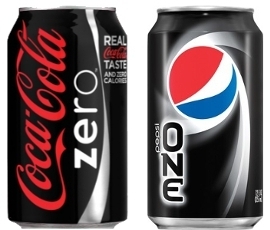
But once the Wachowskis realized that the audience would always side with the group that wanted to shoot robots in the face, they scrapped that idea and made Cypher a secondary baddie. It's certainly possible, given the Zero/One name opposition and the fact that they pretty much did the exact same thing with The Matrix Online. Then again, it's equally possible that the Wachowskis decided on the name "Cypher" because they hate people who study and understand science and wanted to spoil the movie's only twist for them.

Cezary Jan Strusiewicz is a Cracked columnist and editor. Contact him at c.j.strusiewicz@gmail.com.